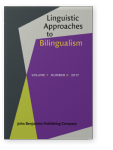Commentary
Language change at the individual level
References (19)
References
Anderson, R. (1999). Impact of first language loss on grammar in a bilingual child. Communication Disorders Quarterly, 21(1), 4–16. 

Anderson, R. T. (2001). Lexical Morphology and Verb Use in Child First Language Loss: A Preliminary Case Study Investigation. International Journal of Bilingualism, 5(4), 377–401. 

Baus, C., Costa, A., & Carreiras, M. (2013). On the effects of second language immersion on first language production. Acta Psychologica, 142(3), 402–409. 

Deuchar, M., & Quay, S. (2001). Bilingual Acquisition: Theoretical Implications of a Case Study. Oxford University Press.
Ezeizabarrena, M. -J. (2012). The (in)consistent ergative marking in early Basque: L1 vs. child L2. Lingua, 122(3), 303–317. 

Lightfoot, D. (1999). The Development of Language: Acquisition, Change, and Evolution (1st ed.). Malden, Mass. Wiley-Blackwell.
Lightfoot, D. (2006). How new languages emerge. Cambridge: Cambridge University Press. 

Meisel, J. M. (2011). Bilingual language acquisition and theories of diachronic change: Bilingualism as cause and effect of grammatical change. Bilingualism: Language and Cognition, 14(2), 121–145. 

Meisel, J. M., Elsig, M., & Rinke, E. (2013). Language acquisition and change: a morphosyntactic perspective. Edinburgh, Scotland: Edinburgh University Press. 

Montrul, S., & Sánchez-Walker, N. (2013). Differential Object Marking in Child and Adult Spanish Heritage Speakers. Language Acquisition, 20(2), 109–132. 

Mueller Gathercole, V. C., & Thomas, E. M. (2009). Bilingual first-language development: Dominant language takeover, threatened minority language take-up. Bilingualism: Language and Cognition, 12(2), 213–237. 

Pascual y Cabo, D., & Rothman, J. (2012). The (Il)Logical Problem of Heritage Speaker Bilingualism and Incomplete Acquisition. Applied Linguistics, 33(4), 450–455. 

Polinsky, M. (2011). Reanalysis in adult heritage language: A case for attrition. Studies in Second Language Acquisition, 33(2), 305–328. 

Romaine, S. (1995). Bilingualism (2nd ed.). Malden, Massachusetts: Wiley-Blackwell.
Simonet, M. (2010). Dark and clear laterals in Catalan and Spanish: Interaction of phonetic categories in early bilinguals. Journal of Phonetics, 38(4), 663–678. 

Simonet, M. (2011). Production of a Catalan-Specific Vowel Contrast by Early Spanish-Catalan Bilinguals. Phonetica, 68(1–2), 68–88.
Tsimpli, I., Sorace, A., Heycock, C., & Filiaci, F. (2004). First Language Attrition and Syntactic Subjects: A Study of Greek and Italian Near-Native Speakers of English. International Journal of Bilingualism, 8(3), 257–277. 

